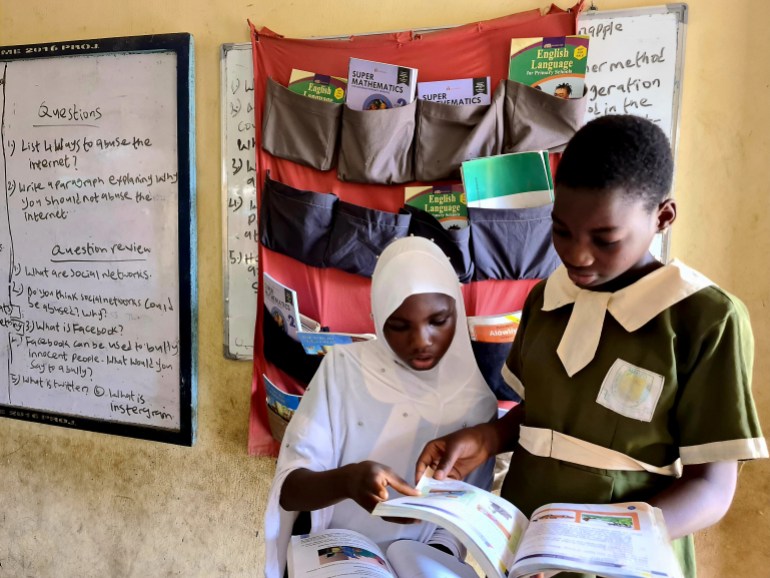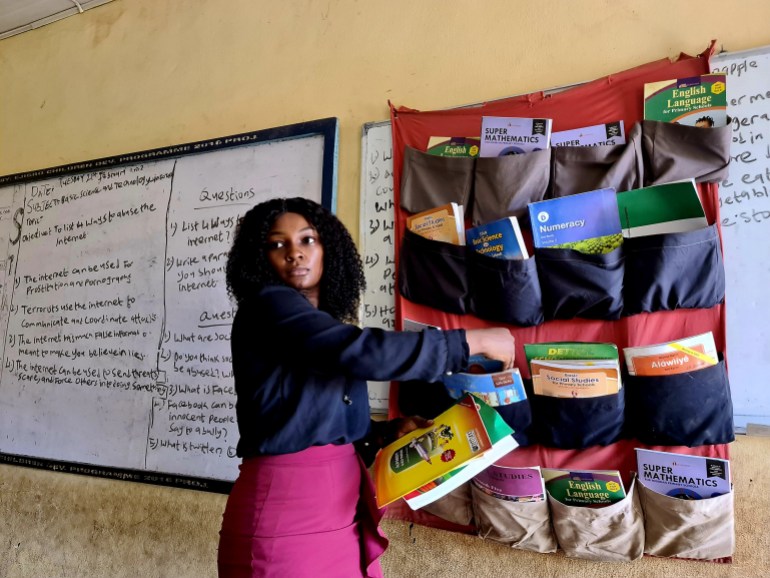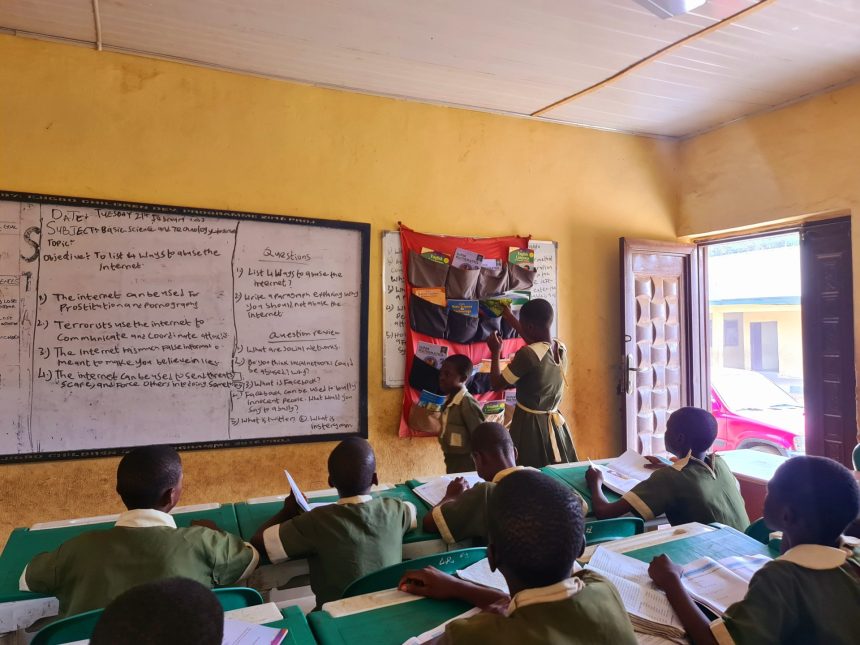[ad_1]
Lagos, Nigeria – Three years ago, Abigail Babatunde found it difficult to read her textbooks at school and always needed the help of her teachers to pronounce difficult words.
Now in primary six, the 11-year-old pupil of a public school in the working-class Lagos suburb of Ejigbo reads them at home unaided. Additionally, she now frequently reads novels about friendship and adventure.
Eniola Akanbi, her class teacher, claims that Babatunde, who wants to be a doctor, is also more active in class. “Now, she [Babatunde] would jump up whenever I asked for a volunteer to come up to read to the classroom,” she said.
“Reading improves my mood,” Babatunde, who wants to be a medical doctor, said. [And] when a teacher asks a question in class, I’m able to respond because I’ve read the day before. While I’m walking along the street, I occasionally read the signboard.”
The story changed due to a new library in her classroom, installed in January 2022.
The library is a bookshelf made from disused fabric hanging from a nail on the wall inside the classroom. Shaped like a hanging shoe rack but slightly larger, it has seven to 10 compartments, each containing between three-to-five books of different sizes. The books are arranged vertically according to their size, in descending order.
The bookshelves are courtesy of The Hanging Library, an initiative of The Neo-Child Initiative, a volunteer group offering mentorship and literacy aid as well as free medical services and drugs to children in low-income neighbourhoods with almost 300 dedicated volunteers.
The initiative is funded mainly through a book drive and contributions from family, friends, and volunteers. There are now 50 libraries and more than 5,000 books from academic textbooks to story books, across Abuja, the federal capital, and cities in six states.

Closing the gap
There are more than 20 million out-of-school children in the country, according to a UNESCO 2022 report. But the quality of basic education in Nigeria has stuttered due to poor funding of state schools and lack of access to basic resources for children who are still in school.
An estimated two-thirds of Nigerians are literate at a basic level since education is free at that level. But this January, Cristian Munduate, UNICEF’s Nigeria representative claimed that “75 per cent of children aged seven-to-14 years cannot read a simple sentence or solve a basic math problem”.
Seyi Bolaji, founder of Kaduna-based Project Educate A Child (ProjectEAC) campaign, thinks these numbers are a conservative estimate.
“The 20 million are those that are counted, what about those that are not counted … because people are still giving birth and they do not care whether these children go to school or not,” said Bolaji.
“Also too much energy is being given to out-of-school children while the ones in school are planning to leave school because the standard of education is declining,” she added. “When those in school are still unable to read and write, what is the point?”
It was this gap that The Hanging Library, which began in 2017 in Lagos, wants to close.
During his mandatory one-year national service in Lagos, Yusuf Shittu, TNCI’s founder would pass by Babatunde’s school on his way to work. One day, he noticed that there was no physical library or an organised space to keep books in the seven-building school complex.
Growing up, his father instilled in him a love of reading newspapers at a young age. So he decided to pass on his love for books, telling Al Jazeera that the initiative is the chance to transform a generation.
Experts have seemed to agree.
“It’s an innovative solution to a deep problem in our society,” said Kemi Ogunsanya, a project manager at Lagos-based online hub TeacherX Project. “A lot of factors and lack of reading materials is one of the causes of the declining rate of reading culture. A lot of schools don’t have libraries and are only left with just bare classrooms.”
More than half of Nigeria’s estimated 200 million people live on less than $2 daily, according to the National Bureau of Statistics. For many of them, their meagre wages can barely afford enough food, much less books for their children.
“You can’t give what you don’t have,” said Bolaji. “There are some families who have not eaten for days, telling them to invest in buying textbooks for their children will make one look stupid.”
The hanging libraries can help children from low-income households at schools improve their grades and have a broadened worldview, said Ogunsanya.
“A reader is a leader,” she said. “A reader will always have an expanded mindset, and all of this will often affect academic progression.

A life-changer
But more needs to be done with initiatives like this, experts said, to target not just children in the classroom but also out-of-school children. “The school is only a building, a child can learn anywhere,” Bolaji said. “We can get this mobile library to them [street kids] and teach them how to read and write.”
According to Shittu, there are plans to expand it to additional communities in other states and develop a plan to replace ripped and missing books but there are financial and logistical challenges to resolve in order to make that happen.
For Babatunde, who lives with her father and lone caregiver, a butcher by day and security guard by night, the library has been a life-changer. By day, she chooses any book available at the library to aid her in her assignment because she is not allowed to take books out of the school.
Often, her book of choice is Without a Silver Spoon, by Eddie Iroh, the story of a boy born into poverty, who is wrongly accused of theft in the household where he works as a domestic help to pay his school fees.
During the daily 15-minute free periods for her class, Babatunde rushes to the hanging library beside the chalkboard, almost breaking into a run to get it, before anyone else does. And on her way back to her seat, she is already flipping through the pages, reading.
[ad_2]
Source link












